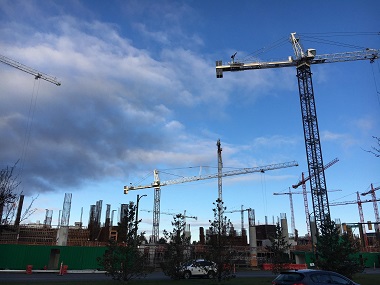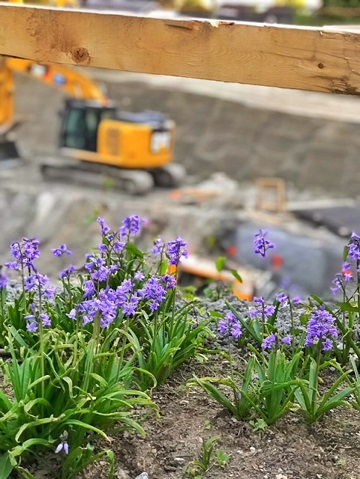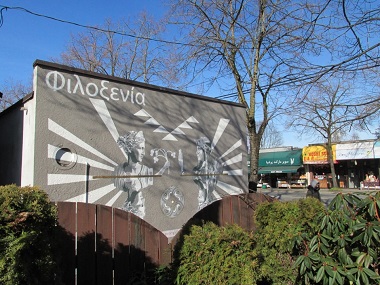
LP revitalizing our tired-looking apple tree of more than 60 years.
Creating Conversation is a weekly editorial, curated by the Centre for Missional Leadership, that gives opportunity for people to speak about issues they believe are vital for the church in Vancouver.
One of the goals of this weekly article is to spark dialogue – and action.
We invite you to join the dialogue here on the Church for Vancouver website. We also invite you to use the article as a discussion starter with your small group, church staff, friends and your neighbours. Thanks for participating in the conversation!
I live in the South Cambie neighbourhood and have called it home for over 20 years. When you have lived decades in one place, and your whole life in the same city, you’re going to see change.

A skyline of cranes at Oakridge Centre Mall – one of many construction sites in the South Cambie / Oakridge neighbourhood.
If you don’t expect change, it can hit you like a ton of bricks . . . and mortar and concrete and excavators and trucks and cranes – literally! A city within a city is being built in and around us with the Oakridge Town Centre development.
There is confusion, chaos, noise, eyesores and disruption on almost every block of our neighbourhood.
Walking the neighbourhood
One practice that has grounded me amidst this chaos is the simple act of walking. Whether I walk for leisure, recreation or utility – and however ordinary or mundane – I consider it a spiritual practice.
Walking has created a space to engage with neighbours. An unhurried and intentional walk, whether it’s along the usual sidewalks or up and down alleyways or trudging through muddy trails of nearby parks, provides ample opportunity to see my neighbours.

Creation’s beauty that remains resolute, defying the upheaval of construction. “Your resolute bluebells that cling to the edge / Subverts the yellow earthmovers like a wedge between darkness and light / They bloom again to our eyes delight.” Slide from Pecha Kucha – 2020 Cultivate Conference
It also allows for appreciation of creation’s beauty that remains resolute even among all the messy construction. It slows me down and sharpens my attentiveness to the activities and presence of neighbours and strangers.
In recent years I’ve come to realize how much I learn from the strangers that cross my path. One such stranger is a gentleman almost a generation older than me. He and his wife moved into the neighbourhood during the pandemic.
I got to know ‘LP’ through his wife, who participates in a Tai Chi Group I joined over a year ago at Queen Elizabeth Park.
He walks with his wife to the activity and then walks her back home again after his own routine of sauntering through the park and neighbourhood.
He greets everyone
LP greets everyone on his walks with a “hello” or “nǐ hǎo” or “zǎoshang hǎo”! I mean everyone! This includes construction workers, traffic flaggers, park staff, dog-walkers and cyclists.
His very limited English doesn’t prevent him from acknowledging an English-speaking stranger with a wave, greeting or asking them about the weather or their dog.
We walk home together after Tai Chi on most days. On our walk, there are often hand gestures, pantomimes and many apologies as we try to communicate our thoughts to each other with the language barrier that exists.
LP recently came by my house to prune and revitalize our tired-looking apple tree. He gifted me with his experience and knowledge in farming and agricultural sciences by tending to our tree. A few days later he came by with a sizable bag full of steer manure and helped dig a trough around the trunk of the tree to deposit the fertilizer.
During these interactions, he’s improving his English and I’m adding a handful of Chinese words and phrases to my repertoire – and we’re forming a friendship.
It has been a revelation to me to see how this kind human made in God’s image is refreshing the souls of those that he greets in our neighbourhood. He smiles, he greets, he waves, he converses. On some of our walks, he even asks me or his wife to take a picture of him as he poses alongside a newly met stranger.
So many people know him in the neighbourhood. He is present and he is faithful with his smiles and his greetings. He fumbles with his English or uses gestures if the foreign words escape him. Whether he realizes it or not, he is transforming the lives of those around him, including mine. He is shaping the culture of our neighbourhood to welcome in the stranger, though he is one of the newest members of our neighbourhood.
Slowing down

Philoxenia mural at 2846 West Broadway .
This new friendship with LP has been a Godsend, reminding me of the value of slowing down and being present with my environment.
Pacing myself like the three mile an hour God who chose to incarnate, grounds me in the life of the neighbourhood and allows me to soak up these life-giving interactions and be more aware of what God is already doing here.
It is in these ordinary and sometimes mundane practices of walking my streets that gives space for hospitality or philoxenia – from Greek φιλοξενία – meaning to care for or befriend the stranger.
Some of us may experience anxiety when we think of hospitality. We might dread cooking, hosting and making our home presentable for guests. Some have a knack in this area for what I will call ‘Martha Stewart’ hospitality. It’s beautiful and a gift to be on the receiving end of it. But what if we don’t have a place we can host or we don’t cook or our house is a mess?
Though hospitality around a table is ideal, there are other, simple acts that convey hospitality without a home and with very few resources. As far as I know, there’s no biblical reference to Jesus’s home during his ministry or of him breaking the bank to feed the thousands. He was houseless and wandered his neighbourhood to love his neighbours. He may have pitched a tent or slept outside. He was even born in a manger. Yes, Jesus was and is God, yet he was also fully human.
Being present
In his human form, Jesus was fully aware of and fully present to those who crossed his path. What does it mean for me to be present?
A few people I know have a transformative quality about them when I interact with them. They are attentive, they look straight into my eyes with curiosity and welcome. They are intentional in speaking to me, but generally ask me about my life and remember discussions we’ve had in the past, though I have long forgotten them. I feel like I’m the only person they see, even in a crowded room. They’re not formulating a response to any of my comments.
They see, they acknowledge and they listen. Their interaction is not transactional and has no agenda. It’s often transformational and grace-filled. They are not easily distracted by the noise that’s going on in the background. That is the presence I’m talking about.
It is surprising to me that I have even experienced that same level of presence and grace with complete strangers. It’s as if we’ve known each other for a lifetime. There’s such a deep connection and a sense of kinship when I’m on the receiving end of this hospitality.
Treat family as you would a stranger
In Mark Glanville’s book, Refuge Reimagined, he refers to Leviticus 25:35-36, which says to treat your family as you would the stranger. Treat your family . . . as you would the stranger! This passage subverts our notion of the presumed order of care with regards to family and strangers:
If any of your kin fall into difficulty and become dependent on you, you shall support them; they shall live with you as though strangers.
Research from Kio Stark and more recent findings in Joe Keohane show how significant simple interactions with strangers can be. Just smiling or saying hello to a stranger can make both parties happier, more connected, mentally sharper, healthier and more trusting and hopeful.
As humans, we know we’re wired to be in relationships. It takes time and it can sometimes be messy for relationships to develop. It’s messy enough to be hospitable to your family, let alone a stranger.
The research also indicates that people are more open and honest to strangers. People can feel more understood by strangers than their family. How paradoxical! Yet it is living into this paradox that is so encouraging to me. There’s a beautiful mutuality in this interaction with the stranger that can be transformative for both parties.
Mutual benefits
Perhaps God gave instructions in caring for the stranger to Israel and for the rest of us to follow, knowing that the stranger benefits us as much as the hospitality does for them. Hospitality is not one-sided.
Sure, it can be something we do for the stranger, but it is the being with the them that creates this presence and mutuality. The lines can be blurred in distinguishing between the host and the guest when being hospitable to the stranger. This may explain why, when I ‘host’ a gathering, I feel just as refreshed, enlivened and connected, as I hope my guests do. It’s a spiritual and divine experience.

Barry Jung
As we slowly come out of this latest wave of the pandemic, and enter a season of renewal and new life, it may be timely to get out our front door and be present to those in our neighbourhood.
Extending hospitality to strangers may benefit them, but I am certain it will benefit us even more, for we may discover that we’re entertaining and receiving from the angels in our midst.
Barry Jung, with family origins from En Ping, China is a third generation settler on the unceded lands of the xʷməθkʷəy̓ə people. As a neighbourhood practitioner, he desires to know and be known by his neighbours and continues to learn what it means to be a follower of Jesus.

Hey Barry! I don’t often go to FB and seldom read fairly lengthy commentaries. However, I am glad I took time to read yours, which is really thought-provoking.
Love it and your every word and thought hit home just like the gift of hospitality expressed in so many different ways! Thanks Barry, really enjoy your sharing❤️
Thanks for this, Barry. Your eloquent articulation of the dynamics of hospitality enriches my understanding of Brentwood Presbyterian’s hospitality with the jazz community, thanks to the genuine welcome our participants offer them in a little space of grace where they love to play. Different focus, granted, by same triune Creator provoking the with-ness and witness.
“with-ness and witness”…. love that phrase, Brian!